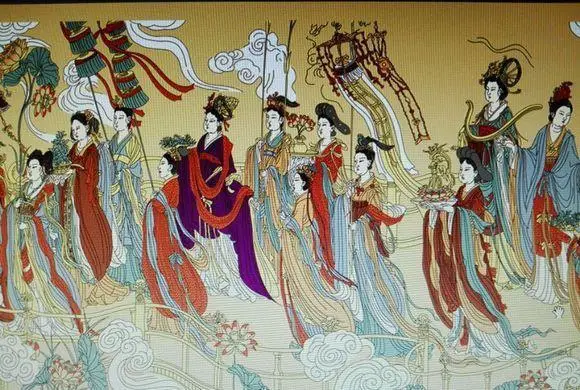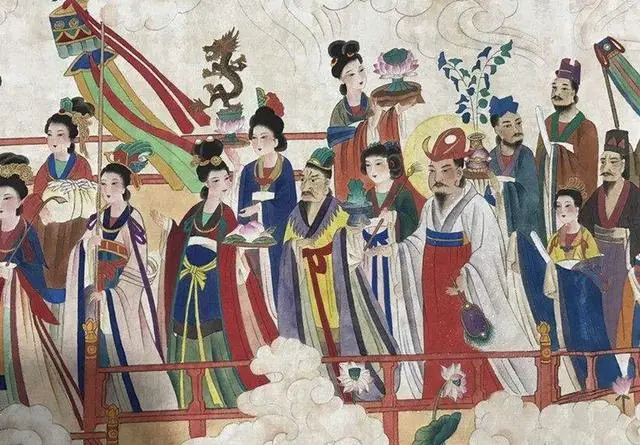Belief in deities, both ancient and modern, has played an important role in Chinese society for millennia. Chinese mythology is rife with deities worthy of human devotion and veneration. In this essay, we will explore the ancient Chinese gods, the four main categories of Chinese gods, and the rituals associated with praying to these deities.
what are the ancient Chinese gods

The pantheon of gods and goddesses in Chinese mythology is wide and diverse, and they are credited with ruling over many different realms of existence. Based on their intended purposes, the ancient Chinese pantheon is divided into distinct groups. These are some of the most well-known deities from ancient China:
Nuwa is the name of the goddess who is credited with creating humanity and mending the broken pillars of heaven.
Fuxi is a deity in Chinese mythology credited with imparting knowledge of fishing, hunting, and firemaking to early humans.
Yu Huang, also known as the Jade Emperor, was revered as the supreme deity in ancient China. They prayed to him for prosperity and success, as he was also worshipped as a god.
Guanyin is a Chinese deity of kindness and compassion.
The warrior god Guan Yu was honoured for his valour and devotion to his country. His statue is commonly found in temples and residences because he was revered as a god by soldiers and martial artists.
Fishermen and sailors looked to Mazu, the goddess of the sea, for safety. Women and children had an ally in her, as she was seen as a guardian figure.
Zhong Kui is a god revered for providing safety from harm and illness.
Xiwangmu, also known as the “West Goddess,” was worshipped as a deity with ultimate power over birth, ageing, and death.
Among the most well-known and well-respected figures in traditional Chinese mythology is Chang’e, the moon goddess.
One such god is Hou Yi, also known as the “Archer God,” who is credited for destroying nine of the 10 suns that would have scorched the planet.
what are the four basic types of chinese gods
There are countless deities in Chinese mythology who have been honoured by worshippers for millennia. These gods and goddesses are classified according to the functions they perform. There are four main categories of Chinese deities: gods of the heavens, gods of the earth, gods of the ancestors, and ghosts and demons.
Holy Gods in Heaven
Gods of the heavens are heavenly creatures that humans believe rule over different parts of the cosmos from their heavenly abodes. These gods and goddesses are revered as supreme beings in the pantheon. The Jade Emperor, or Yu Huang, is one of the most significant Chinese heavenly deities. The other gods and goddesses in heaven answer to him as they do to no other god. Tian, the sky deity, and Lei Gong, the god of thunder, are two of the many gods of heaven.
Nature Deities
The term “earth god” refers to a pantheon of deities worshipped as the spiritual rulers of natural features on Earth. They have a deeper understanding of human nature and the challenges we face in our daily lives. The Earth God, or Tu Di Gong, is a widely worshipped deity associated with the planet Earth. He is revered as the guardian deity of a certain area or community, and his blessings are sought out in the hopes of a prosperous crop. The River God, the Mountain God, and the Forest God are also deities of the soil.
Pagan Deities of Olde
The gods of the ancestors are the spirits of ancestors who are thought to have some sort of influence over the lives of their descendants. They are revered throughout lifecycle events like weddings and funerals because of their status as revered family members. Many Chinese households feature ancestral altars, where ancestors can be honoured and appeased. Huang Di, the progenitor of all Chinese people, is the most revered ancestor god in Chinese mythology.
Spirits and Devils
It is often held that ghosts and demons are malicious spirits intent on causing human damage and trouble. Many people fear them since they are regarded as the lowest of the gods. The ghost of Qin Hui, a corrupt official from the Song era, is one of China’s most well-known phantoms. Some say he is a vengeful ghost who seeks revenge on those who harmed him in life. On the other hand, demons are frequently portrayed as terrifying beings endowed with eerie abilities. Nezha, a prominent figure in Chinese mythology, is one of the most well-known demon gods.
What God Do They Worship in China?
Since ancient times, Chinese culture has been deeply rooted in polytheism. A few of China’s many deities stand out from the crowd. The Jade Emperor, also known as Yu Huang, is one of the most revered deities in Chinese religion.
In Chinese mythology, the Jade Emperor is worshipped as the supreme deity and is thought to rule over all other gods and goddesses. Several images of him include a regally attired man with a staff in his hand, portraying him as a stern and powerful figure. The Mandate of Heaven, often known as the notion that the ruler of China has the divine right to rule and govern the country, is closely linked to the Jade Emperor.
The God of Wealth, the God of War, and the God of Agriculture are among the pantheon of deities honoured in China, in addition to the Jade Emperor. Several Chinese individuals pray to Caishen, or the God of Wealth, in the belief that doing so will bring them financial success. Guan Yu, also known as the God of War, is widely adored by military personnel and martial artists because to his reputation for devotion and valour. A deity known as Shennong is credited with introducing cultivation to the Chinese people.
Many Chinese people’s lives revolve around the worship of many deities, making it an integral element of the country’s cultural fabric. Many Chinese people regularly visit one of the many temples across the country that is dedicated to their personal deity. Many Chinese festivals and holidays, such as the Lunar New Year and the Mid-Autumn Festival, also involve the worship of gods and goddesses.
How to Pray Chinese Gods
Traditional Chinese culture includes regular worship of a wide variety of deities. Whilst the specifics of worshipping to a Chinese deity may change based on who or what is being prayed to, most adhere to a set of universal tenets.
Offerings
Making sacrifices to the Chinese pantheon is a fundamental aspect of worship. Items that are offered to the gods can range from food to incense and candles. Most religious practises involve making an offering at a shrine or altar to the god being honoured.
Bowing
The act of bowing is central to Chinese religious practise. It’s a symbol of utmost deference and modesty, and it’s customarily done thrice. Some people may display their devotion by getting on their knees or prostrating themselves.
Requests and Blessings
Worship is not complete without the offering of prayers and petitions to God. In their prayers, believers often ask the gods for help in achieving their own goals of health, riches, and happiness. In addition, they regularly seek advice and assistance from others. It is hoped that the divine would hear these petitions and provide answers and direction.
Gratitude
One of the most significant aspects of Chinese religious practise is the expression of appreciation to the gods. It is common practise to express gratitude to a deity after getting favours or help from that being venerated.
Celebrations and Vacations
The worship of deities plays an important role in many Chinese celebrations and holidays. During these gatherings, worshippers might congregate to present gifts and prayers to the gods. Many people feel that praying on certain holidays will increase the benefits they receive.
chinese god and goddess list

Chinese mythology features a plethora of deities, each with their own backstory, personality traits, and symbolic meanings. For a longer rundown of the Chinese pantheon, see below:
Throughout Chinese mythology, the highest deity is known as the Jade Emperor.
Guan Yu is a military deity and a symbol of devotion and morality in Chinese mythology. He is typically represented with a long beard and a green dragon cloak.
Mazu is the sea goddess who protects fisherman and is revered for her kindness and curative powers.
Cai Shen is the deity of prosperity in Chinese mythology, and his iconography typically includes him clutching a gold ingot and a pile of coins.
Nezha is a god of protection who frequently takes the form of a child wielding a magical staff, a weapon, and a lotus flower.
In the ancient Chinese novel “Journey to the West,” the protagonist is a monkey deity named Sun Wukong, who is renowned for his strength, speed, and magical powers.
Often represented with a dark visage and a lengthy beard, Zhang Fei is a god of martial arts and loyalty.
A goddess of kindness and compassion, Kuan Yin is linked to healing and protection. She is typically shown with a serene look while holding a vase.
Zhao Gongming is a god of prosperity, contentment, and safety; he is typically represented with a scarlet visage and a halberd.
Peach-bearing Xi Wangmu is the goddess of longevity and immortality, and she is frequently represented with a phoenix, a jade rabbit, or a crane.
The god of thunder, Lei Gong is commonly represented with a hammer or a drum, and is believed to have the ability to drive away evil spirits.
The Moon Goddess, Chang’e, is often represented with a lotus or a jade rabbit, symbols of beauty and immortality in Chinese culture.
Feng Po Po, the Wind Goddess, is commonly represented riding a tiger, and she is believed to have the ability to both bring good fortune and remove impediments.
Sometimes represented as a dragon or a snake, Yu the Great is a god revered for his role in preventing floods and establishing China’s first dynasty.
The Buddhist goddess Guan Yin Citta is well-known for her capacity to alleviate human suffering and bring about enlightenment.
Legendary soldier Hua Mulan, who fought in the army while dressed as a man, was eventually worshipped as a goddess.
Zhurong is a god of fire and wisdom and bravery who is typically represented with a serpent or a dragon.
The goddess He Xiangu is commonly represented with a peach and a lotus flower, symbols of long life and healing.
Lan Caihe is a god of inebriation and insanity who is typically represented with torn garments and a bamboo staff.
There are many more gods and goddesses in Chinese mythology, but these are just a few examples. For hundreds of years, these deities have been revered as an integral element of Chinese culture, and their legends have inspired and fascinated listeners all over the world. The gods and goddesses of Chinese mythology provide a window into the worldview and ideals of the ancient Chinese people, whether they personify elements of nature, human virtues, or supernatural forces.